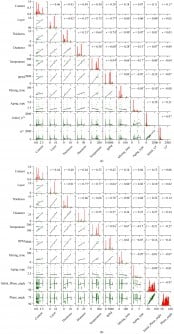Science
Researchers Use AI to Enhance Asphalt Durability with Graphene Oxide

Researchers at the University of Transport Technology in Vietnam have developed a novel approach to predict the viscoelastic characteristics of asphalt modified with graphene oxide (GO). This advancement is crucial as traditional asphalt pavements struggle to meet the performance demands posed by increasing traffic loads and the adverse effects of climate change. The study, titled “Application of Extreme Gradient Boosting in Predicting the Viscoelastic Characteristics of Graphene Oxide Modified Asphalt at Medium and High Temperatures,” utilizes artificial intelligence to streamline the assessment of asphalt properties.
Conventional methods for determining key viscoelastic indicators—complex modulus (G*) and phase angle (φ)—in GO-modified asphalt are often complex, expensive, and time-consuming. To address these challenges, the research team constructed an extreme gradient boosting (XGB) model aimed at predicting G* and φ at medium and high temperatures. The model draws on two datasets from previously published experiments, comprising 357 samples for G* and 339 samples for φ, incorporating nine input parameters representing various asphalt binder components.
Model Performance and Comparative Analysis
The results indicate that the XGB model demonstrates exceptional predictive accuracy for both G* and φ. Evaluated using the coefficient of determination (R2) and the root mean square error (RMSE), the model achieved R2 values of 0.990 for G* and 0.9903 for φ, with corresponding RMSE values of 31.499 and 1.08. This level of performance significantly exceeds that of five other machine learning models, including artificial neural networks and decision trees, reaffirming the XGB model’s superior accuracy.
In addition to predictive performance, the research included an analysis using Shapley additive explanations (SHAP) values to evaluate the impact of input parameters on the viscoelastic properties of asphalt. This analysis identified the initial properties of the asphalt, GO content, and mixing temperature as the most critical factors influencing the material’s performance.
Implications for Asphalt Engineering
The implications of this research extend beyond theoretical advancements. By leveraging machine learning techniques, the study paves the way for more efficient and cost-effective methods of evaluating asphalt modified with graphene oxide, which is known for its potential to enhance mechanical properties. As the demand for resilient infrastructure grows, this innovative approach could play a vital role in developing pavements that withstand the challenges posed by increasing traffic and environmental factors.
The full study, authored by Huong-Giang Thi HOANG, Hai-Van Thi MAI, Hoang Long NGUYEN, and Hai-Bang LY, is available for further reading at: https://doi.org/10.1007/s11709-024-1025-y.
This research not only enhances the understanding of GO-modified asphalt but also highlights the potential of machine learning in materials science, promising a more resilient future for road infrastructure worldwide.
-

 Lifestyle4 months ago
Lifestyle4 months agoLibraries Challenge Rising E-Book Costs Amid Growing Demand
-

 Sports3 months ago
Sports3 months agoTyreek Hill Responds to Tua Tagovailoa’s Comments on Team Dynamics
-

 Sports3 months ago
Sports3 months agoLiverpool Secures Agreement to Sign Young Striker Will Wright
-

 Lifestyle3 months ago
Lifestyle3 months agoSave Your Split Tomatoes: Expert Tips for Gardeners
-

 Lifestyle3 months ago
Lifestyle3 months agoPrincess Beatrice’s Daughter Athena Joins Siblings at London Parade
-

 World3 months ago
World3 months agoWinter Storms Lash New South Wales with Snow, Flood Risks
-

 Science4 months ago
Science4 months agoTrump Administration Moves to Repeal Key Climate Regulation
-

 Science3 months ago
Science3 months agoSan Francisco Hosts Unique Contest to Identify “Performative Males”
-

 Business4 months ago
Business4 months agoSoFi Technologies Shares Slip 2% Following Insider Stock Sale
-

 Science4 months ago
Science4 months agoNew Tool Reveals Link Between Horse Coat Condition and Parasites
-

 Sports4 months ago
Sports4 months agoElon Musk Sculpture Travels From Utah to Yosemite National Park
-

 Science4 months ago
Science4 months agoNew Study Confirms Humans Transported Stonehenge Bluestones









